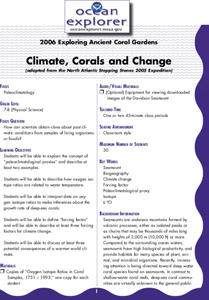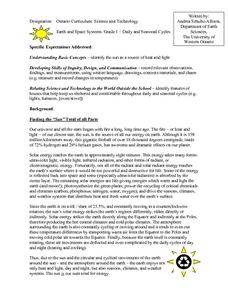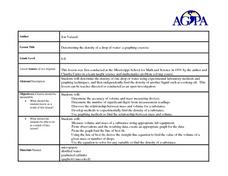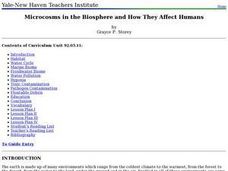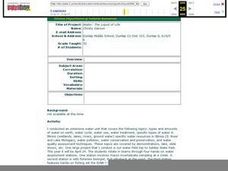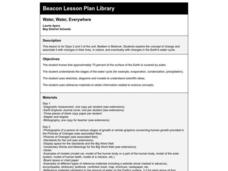Curated OER
Water Table
Students study the meaning of a water table and how it contributes to the existence of streams, swamps, and lakes in Nebraska. They conduct an experiment and complete a diagram of the hydrologic cycle.
Curated OER
Evaporation and Condensation
Students explore how temperature affects the processes of evaporation and condensation.
Curated OER
Weather Olympics
Students consider the effects of topography on climate patterns. In this earth science instructional activity, students research weather patterns and make inferences of how the land forms may create different climates. Students compare...
Chicago Botanic Garden
Greenhouse Gas Emissions – Natural and Human Causes
Part three in the series of seven has pupils discussing the different greenhouses gases, learning about the carbon cycle, and then watching a short video about the carbon cycle. Based on their knowledge, individuals complete a greenhouse...
Curated OER
The Marvels of Mud
Young scientists roll up their sleeves and get a little dirty in this three-day earth science investigation. Following the scientific method, children monitor the growth of algae in pond water samples in order to determine the role that...
Space Awareness
Ocean Acidification
Learn the science behind ocean acidification and its effects on ocean wildlife. Young scientists conduct a laboratory investigation that monitors the acidity level of water. While burning a candle, learners capture the carbon dioxide in...
NOAA
Climate, Corals and Change
Global warming isn't just an issue on land; deep ocean waters are also showing troubling signs. Young scientists learn more about deep water corals and the many recent discoveries researchers have made. Then they examine data related to...
Curated OER
Brine Shrimp Life Cycle
Third graders examine brine shrimp through "A Sea Monkey's Life" story. They study the living environments and life cycle of brine shrimp. They look at brine shrimp and cysts through a microscope, identifying new vocabulary that was...
Curated OER
The Spider's Life Cycle
Students see that spiders have a life cycle, and reproduce by laying many eggs. We can count by ones, twos, fives, or as many as we want. They make two lists of animals on a chart.
Curated OER
Oyster Culture Cycle Worksheet
For this oyster culture cycle worksheet, students answer 31 questions about the six stages of the oyster culture cycle. They also answer questions about the oyster business.
Curated OER
Seasonal Cycles And Changes
Second graders recall the affect of direct and angled sunlight on the seasons, describe some results of warming soil and air in spring, predict the changes in buds when twigs are placed in water, and taste a product of tree sap and...
Curated OER
Water Water Water - Costume Designing
Young scholars create costumes using recycled materials determined beforehand by the teacher in this High School Drama/Art lesson on costume designing. The example lesson is based around the title of "Water, Water, Water" but can be...
Curated OER
Daily and Seasonal Cycles
First graders identify the sun as a source of heat and light. They identify features of houses that help keep use sheltered and comfortable throughout daily and seasonal cycles. Students are told that summer is the best season to...
Curated OER
Determining the Density of a Drop of Water-A Graphing Exercise
Students determine the density of 1 drop of water. In this determining density lesson plan, students determine the mass and volume of a drop of water in the lab using appropriate lab techniques and calculate the density of a drop of water.
Curated OER
Family Life Cycle - Older Adult Lab
Students pretend to be old by simulating some of the struggles older people face every day with arthritis in their hands, hearing impaired, and normal loss of up close vision as they experience preparing a recipe. They identify the...
Curated OER
Science: Microcosms in the Biosphere
In a series of lessons, examine the impact on humans by microcosms in the biosphere. Among the plans structured for learners with different abilities and learning styles, are activities describing the symbiotic relationship, drawing the...
Curated OER
Recycled Water?
Students participate in a hands-on activity to investigate how water is recycled in a small environment, and determine how water is cycled on earth.
Curated OER
Investigating Earth's Materials
First graders compare and contrast water from different sources. After collecting water from various sources, 1st graders create a list of observable properties of the water. Students then pour the water into a filter and observe the...
Curated OER
Water: The Liquid of Life
Sixth graders complete a lesson on the properties, types and amounts of water on Earth. In groups, they travel between stations to identify water resources in Illinois and pollution sources. They complete the lesson with a field trip...
Curated OER
Butterfly Lifecycle
First graders examine diagrams of butterflies printed from the stated website and follow directions to make a model of the butterly life cycle. They then participate in a WebQuest to observe the life cycle stages of a butterfly.
Curated OER
Water Quality
In this unit of lessons, 2nd graders examine the water quality of the water on the planet. They discover how much water is on the planet and how to conserve their water usage.
Curated OER
Water Use and Conservation
Young scholars discuss the different types of water found on Earth. They discover why not all water is used for drinking and calculate how much water they use. They create their own water conservation plan.
Curated OER
Water Conservation
Students create short videos about water conservation using the computer program iMovie in this cross-curricular lesson provided by the Florida Center for Instructional Technology.
Other popular searches
- Water Cycle Diagram
- The Water Cycle
- Water Cycle Experiment
- Water Cycle Activities
- Water Cycle Stages
- Water Cycle Crossword
- Water Cycle Lesson Plans
- Water Cycle Reader's Theater
- Water Cycle and Evaporation
- Water Cycle Diagram Label
- Water Cycle Simulation
- Build Your Own Water Cycle








